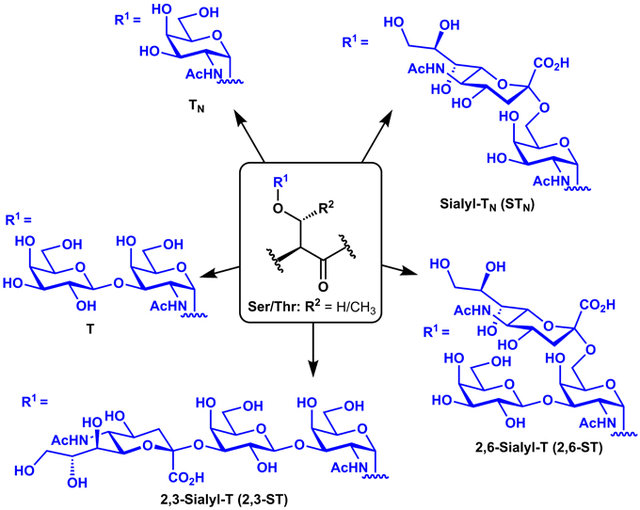Cancer-associated Carbohydrate Identification
Since cancer-associated carbohydrates are often expressed on tumor cells at higher densities than many oncogenes and are found on multiple proteins in a variety of tumors, they have potential not only as diagnostic tools but also as specific therapeutic targets. With Ph.D. level scientists and extensive experience in carbohydrate research, Creative Biolabs is fully competent and dedicated to serving as your one-stop-shop for cancer-associated carbohydrate identification. We would like to share our knowledge and passion in this field to facilitate our customers' research development.
Introduction of Cancer-associated Carbohydrate
Oncogenesis is often associated with changes in the expression of cell surface carbohydrates. In some instances, the carbohydrate pattern may be specific to the disease type, such as cancer. Cancer cells can be distinguished from normal cells by displaying aberrant levels and types of carbohydrate structures on their surfaces. These carbohydrate structures are known as cancer-associated carbohydrate or tumor-associated carbohydrate antigens (TACAs). Carbohydrates play crucial roles in various biological events such as cell recognition, inter- and intracellular signaling, embryonic development, cell adhesion, and cell-cell interactions.
Technologies for Carbohydrate Marker Discovery
The appearance of novel carbohydrate epitopes that accompany the malignant transformation of cells has long made carbohydrates attractive targets for diagnostic, prognostic, and immunotherapeutic use. The identification of cancer-associated carbohydrates has been hampered by the lack of suitable technologies because of the complex chemistry of carbohydrates. Carbohydrate identification has relied primarily upon lectin microarray of tumors and tumor cell lines. Although undoubtedly useful, lectin microarray is limited to very few anticarbohydrate monoclonal antibodies and the carbohydrate-specificities of lectins are largely uncharacterized. Currently, carbohydrate marker discovery with glycan microarray analysis presents great potential for identifying biomarkers relevant for the diagnosis of different types of cancers.
 Fig.1 Structures of common TACAs.1, 2
Fig.1 Structures of common TACAs.1, 2
Cancer-associated Carbohydrate Identification at Creative Biolabs
Glycan microarray allows direct characterization of carbohydrate-protein interactions. Microarray techniques are effective and sensitive methods for the rapid analysis of the specificity of protein-carbohydrate interactions and the characterization of differentiation processes about the onset of cancer at the molecular level.
We used carbohydrate array technology to compare serum antibody levels against different carbohydrates between cancer patients and healthy controls. Then, serum levels will be measured by ELISA against carbohydrates identified. Glycan microarray analysis can also be used to explore the diagnostic possibility of serum antibody changes as biomarkers for particular cancer. Glycan microarray analysis provides a powerful tool for high-sensitivity and high-throughput detection of serum antibodies against cancer-associated carbohydrate, which may be valuable serum biomarkers for the early detection for a particular cancer patient.
Highlights
-
Glycan microarray for cancer-associated carbohydrate identification
-
High sensitivity and high-throughput
-
High flexibility and cost-effectiveness
-
Best after-sale service
Creative Biolabs is dedicated to offering high-quality cancer-associated carbohydrate identification service using glycan microarray to meet our clients' R&D timeline and budget. For more detailed information, please feel free to contact us or directly send us an inquiry.
References
-
McDonald, David M., Scott N. Byrne, and Richard J. Payne. "Synthetic self-adjuvanting glycopeptide cancer vaccines." Frontiers in chemistry 3 (2015): 60.
-
Under Open Access license CC BY 4.0, without modification.
For Research Use Only.
Related Services

 Fig.1 Structures of common TACAs.1, 2
Fig.1 Structures of common TACAs.1, 2

